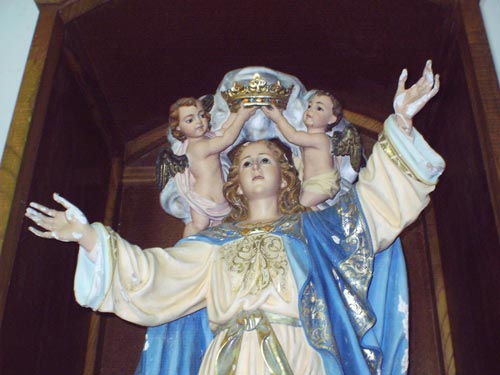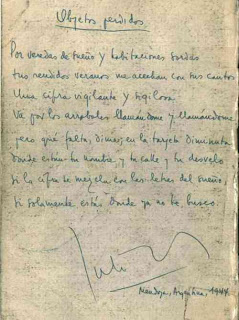 On the part of the King, Don Fernando, and of Doña Juana, his daughter, Queen of Castille and León, subduers of the barbarous nations, we their servants notify and make known to you, as best we can, that the Lord our God, Living and Eternal, created the Heaven and the Earth, and one man and one woman, of whom you and we, all the men of the world at the time, were and are descendants, and all those who came after and before us. But, on account of the multitude which has sprung from this man and woman in the five thousand years since the world was created, it was necessary that some men should go one way and some another, and that they should be divided into many kingdoms and provinces, for in one alone they could not be sustained.
On the part of the King, Don Fernando, and of Doña Juana, his daughter, Queen of Castille and León, subduers of the barbarous nations, we their servants notify and make known to you, as best we can, that the Lord our God, Living and Eternal, created the Heaven and the Earth, and one man and one woman, of whom you and we, all the men of the world at the time, were and are descendants, and all those who came after and before us. But, on account of the multitude which has sprung from this man and woman in the five thousand years since the world was created, it was necessary that some men should go one way and some another, and that they should be divided into many kingdoms and provinces, for in one alone they could not be sustained.
Of all these nations God our Lord gave charge to one man, called St. Peter, that he should be Lord and Superior of all the men in the world, that all should obey him, and that he should be the head of the whole human race, wherever men should live, and under whatever law, sect, or belief they should be; and he gave him the world for his kingdom and jurisdiction.
And he commanded him to place his seat in Rome, as the spot most fitting to rule the world from; but also he permitted him to have his seat in any other part of the world, and to judge and govern all Christians, Moors, Jews, Gentiles, and all other sects. This man was called Pope, as if to say, Admirable Great Father and Governor of men. The men who lived in that time obeyed that St. Peter, and took him for Lord, King, and Superior of the universe; so also they have regarded the others who after him have been elected to the pontificate, and so has it been continued even till now, and will continue till the end of the world.
One of these Pontiffs, who succeeded that St. Peter as Lord of the world, in the dignity and seat which I have before mentioned, made donation of these isles and Tierra-firme to the aforesaid King and Queen and to their successors, our lords, with all that there are in these territories, as is contained in certain writings which passed upon the subject as aforesaid, which you can see if you wish.
So their Highnesses are kings and lords of these islands and land of Tierra-firme by virtue of this donation: and some islands, and indeed almost all those to whom this has been notified, have received and served their Highnesses, as lords and kings, in the way that subjects ought to do, with good will, without any resistance, immediately, without delay, when they were informed of the aforesaid facts. And also they received and obeyed the priests whom their Highnesses sent to preach to them and to teach them our Holy Faith; and all these, of their own free will, without any reward or condition, have become Christians, and are so, and their Highnesses have joyfully and benignantly received them, and also have commanded them to be treated as their subjects and vassals; and you too are held and obliged to do the same. Wherefore, as best we can, we ask and require you that you consider what we have said to you, and that you take the time that shall be necessary to understand and deliberate upon it, and that you acknowledge the Church as the Ruler and Superior of the whole world, and the high priest called Pope, and in his name the King and Queen Doña Juana our lords, in his place, as superiors and lords and kings of these islands and this Tierra-firme by virtue of the said donation, and that you consent and give place that these religious fathers should declare and preach to you the aforesaid.
If you do so, you will do well, and that which you are obliged to do to their Highnesses, and we in their name shall receive you in all love and charity, and shall leave you, your wives, and your children, and your lands, free without servitude, that you may do with them and with yourselves freely that which you like and think best, and they shall not compel you to turn Christians, unless you yourselves, when informed of the truth, should wish to be converted to our Holy Catholic Faith, as almost all the inhabitants of the rest of the islands have done. And, besides this, their Highnesses award you many privileges and exemptions and will grant you many benefits.
But, if you do not do this, and maliciously make delay in it, I certify to you that, with the help of God, we shall powerfully enter into your country, and shall make war against you in all ways and manners that we can, and shall subject you to the yoke and obedience of the Church and of their Highnesses; we shall take you and your wives and your children, and shall make slaves of them, and as such shall sell and dispose of them as their Highnesses may command; and we shall take away your goods, and shall do you all the mischief and damage that we can, as to vassals who do not obey, and refuse to receive their lord, and resist and contradict him; and we protest that the deaths and losses which shall accrue from this are your fault, and not that of their Highnesses, or ours, nor of these cavaliers who come with us. And that we have said this to you and made this Requisition, we request the notary here present to give us his testimony in writing, and we ask the rest who are present that they should be witnesses of this Requisition."
See
here for the original text in Spanish.
I used to think that John Paul II’s millennium apologies were unjustified. Why should anyone apologize for something he or she did not personally do? I suppose at the time they were done, I was still in my Lefebvrist, ultra-triumphalist phase, and this made me suspicious of anything the Papacy did. I guess reading the above, I understand what the last Pontiff was trying to get at.
The author was not the Pope himself, of course, but rather the Spanish jurist, Juan López de Palacios, who was the main apologist for the conquest of the Americas. The principal, of course, is the extreme ultra-montanism that governed Spanish Catholicism from very early. However, this idea was also based on the very real Treaty of Tordesillas, and more specifically the Papal document, Inter caetera, which pretended that the Pope had the power to divide the world in two halves among Spain and Portugal.
By these poorly reasoned documents, then, atrocities were often committed. The above document was often read by Spanish soldiers to indigenous tribes in the most pristine and correct Castilian, which more often than not the natives did not speak. What would take place next was often something along the lines of the following:
And the Spaniards, on the morning of the day they arrived at the town, stopped to breakfast in a riverbed that was dry but for a few shallow pools. This riverbed was full of whetstones, and all longed to sharpen their swords upon them.
Having reached the village after this picnic, the Spaniards decide to test whether their swords are as sharp as they seem. A Spaniard, in whom the devil is thought to have clothed himself, suddenly drew his sword. Then the whole hundred drew theirs and began to rip open the bellies, to cut open those lambs – men, women, and old folk, all of whom were seated, off guard and frightened, watching the mares and the Spaniards. And within two credos, not a man of all of them remains alive. The Spaniards enter the large house nearby, for this was happening at its door, and in the same way, with cuts and stabs, begin to kill as many as they found there, so that a stream of blood was running, as if a great number of cows perished.
-Fray Bartolomé de las Casas as cited by Tzvetan Todorov’s The Conquest of America (p. 141)
Even if De las Casas’ telling of a massacre was a freak occurrence, modern scholarship is now quite certain that either by disease, overwork, or bloodshed, millions perished at the hands of the Catholic Spaniards, all justified by the Requerimiento above.
Cuauhtemoc [the last emperor of the Aztecs] too died in a somewhat Christian manner: “The Spaniards hanged him from a silk-cotton tree,” but “a cross was placed in his hands”… (ibid, p.169).
And when most of the indigenous peoples were killed in many places, that is when the forced bloody diaspora of millions of Africans began, but that would be the subject of another post.
All blame cannot be put on the Catholic Church. If the Protestants in the north have a little less blood on their hands, it’s only because they didn’t get to these places first. Catholics are not crueler than Protestants.
So what is my point? That we should question the integrity and veracity of the Catholic Church? Far be it from me to do so. But we must always be aware that in our own approach to religious questions, there always lurks a sinful tendency to marginalize people as the “Other”.
Thankfully, this mostly takes place in the form of an argument where we regard the other person as someone to score points off of. The most extreme cases, however, are the ones above. And both cases are very far from real Christianity.
All our endeavors are not pure. Even when I speak to Protestants or people who are hostile to the Roman Catholic faith, I really have to keep in mind that it is not about winning or losing. It is not really even about convincing in one sense. It is above all a question of witnessing. And as we know, the word “martyr” derives from the Greek word, “to witness”. When we approach people who are not Christians or who disagree with us, we should have the attitude of martyrs, not soldiers or lawyers. Neither are we to have a team or a herd mentality where we separate ourselves from an amorphous "them". I don’t do these things as often as I should, but maybe I need to try harder.
That, I would venture, is what the last Pontiff was trying to apologize for, in simple terms. It is not for having the Truth, but for being unfaithful stewards of that Truth. When knocking on people's hearts, we must use fragile keys and not battering rams. This requires that we be ever vigilant, both over our mouths and our hearts.



























